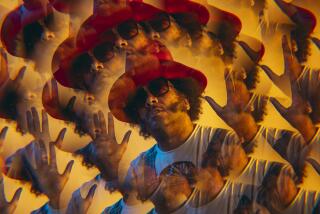WHAT HAPPENS TO POP MUSIC STARS AFTER THE CRUSADE? : Little Steven Van Zandt Frustrated That ‘Making of Sun City’ Won’t Play on PBS
Little Steven Van Zandt stood beaming in the elegant ballroom at Le Bel Age Hotel, still somewhat awestruck by his encounter with former CBS News president Fred W. Friendly.
“What an inspiration,” Van Zandt said, as Friendly turned to greet a friend. “You know, he did a documentary on South Africa, too.”
Friendly returned and the two rehuddled in conversation.
At first glance, the tall media cynosure in his business suit and the spunky bare-chested rocker in his gypsy scarf would appear to have little in common, except that both had just been honored at the International Documentary Assn.’s second annual awards luncheon. (Friendly received a career achievement award. Van Zandt received an achievement award for his “Sun City/Making of Sun City” anti-apartheid documentary.)
However, as Friendly, professor emeritus at Columbia University Graduate School of Journalism, has been called the conscience of American broadcast journalism, so has Van Zandt come to be represented by some as the political conscience of American rock.
And what united the two in conversation earlier this week was Friendly’s empathetic concern with the problems Van Zandt has getting his “Sun City” documentary on public TV and not just MTV.
Friendly, who had seen only an excerpt from the documentary, praised it and said the Public Broadcasting Service’s refusal to air the show was “indicative” of the endangered future of documentaries on commercial and public TV.
Documentaries are necessary to “penetrate the baloney of the people who would obfuscate” on issues of importance to the public, Friendly said.
For months, however, Van Zandt has been trying to determine why PBS won’t play “Sun City.”
After showing initial interest in airing the program last June, PBS--which distributes most national public television programming--rejected “Sun City/Making of Sun City” in September. According to Van Zandt, PBS’s action put it in the same position as the South African Broadcasting Corporation, which also won’t air the program.
PBS says the 51-minute program doesn’t conform to its standards and guidelines. When Van Zandt wrote for further explanation, he received this response from PBS programming vice president Barry Chase:
“PBS is (not) required to endorse your effort to persuade other performers to avoid ‘Sun City,’ congratualate you for your moral position on apartheid or help stimulate sales of the . . . video or album.”
Chase later told the entertainment industry trade paper Daily Variety that “Sun City” was a “one-line joke” and its performers “spoiled brats.”
The rejection and Chase’s subsequent comments have been protested by a congressman, a South African anti-apartheid activist and a number of arts and journalism organizations.
The “Sun City” documentary chronicles the December, 1985, recording of “Sun City” by a cross-section of 54 leading musicians--among them Miles Davis, Bruce Springsteen and Bob Dylan. Intercut with South African news footage, interviews and montages, the song’s refrain “Ain’t gonna play Sun City” refers to entertainers who refuse to play in Sun City, a gambling resort in a nominally independent South African tribal homeland.
After PBS’ initially positive response, Van Zandt said, the network suggested a series of changes to bring it in line with PBS guidelines. Although he and others involved in producing the program asked for a written list of suggested changes and a copy of the guidelines, none was received, Van Zandt said.
“It seems to be a misunderstanding more than anything else,” Van Zandt said. “I’m hoping they’ll reconsider their actions.”
That’s not likely, PBS’ Chase said in a telephone interview Friday. He stood behind his decision not to air “Sun City,” but he apologized for and said he “regretted” his remarks to Daily Variety.
“We took a lot of time and care with that decision,” Chase said. “You don’t allow a group to produce something about themselves. If we let that barrier down, there will be a flood of so-called documentaries.”
Rick Dutka, a spokesman for Artists United Against Apartheid (the organization established for the Sun City project), said Chase’s comments “betray a lack of understanding and very little sensitivity about what this whole effort is about. The artists did ‘Sun City’ for free, some against the wishes of their management. The original interviewing done for the ‘Making of Sun City’ was conducted by journalists, then we expanded it with additional information. Our intent has always been educational--that’s why we had a teaching guide prepared.”
PBS’ action has been criticized by Rep. William H. Gray III (D-Pa.), the author of the Anti-Apartheid Acts of 1985 and 1986; Jesse Jackson; the International Documentary Assn.; Fairness and Accuracy in Reporting; the Assn. of Independent Video and Film Makers, and record producers who sent letters to PBS President Bruce Christensen asking that the “Sun City” decision be overturned. Christensen could not be reached for comment.
Protesting letters mentioned that PBS had broadcast promotional shows such as “The Making of ‘Raiders of the Lost Ark’ ” and “The Making of ‘Star Wars.”
Chase said that “Raiders” and “Star Wars” were cultural productions, not news shows. Still, he called their airing a “mistake that won’t be repeated.”
Chase said he was impressed that “Sun City” won an International Documentary Assn. award alongside such acclaimed documentaries as “Shoah” and Malcolm Clarke’s examination of Vietnam veterans living survivalist lives, “Soldiers in Hiding.”
“We’ll probably show those other two,” he said, but reiterated that he had no plans to reevaluate his decision on the Van Zandt project.
More to Read
The biggest entertainment stories
Get our big stories about Hollywood, film, television, music, arts, culture and more right in your inbox as soon as they publish.
You may occasionally receive promotional content from the Los Angeles Times.










